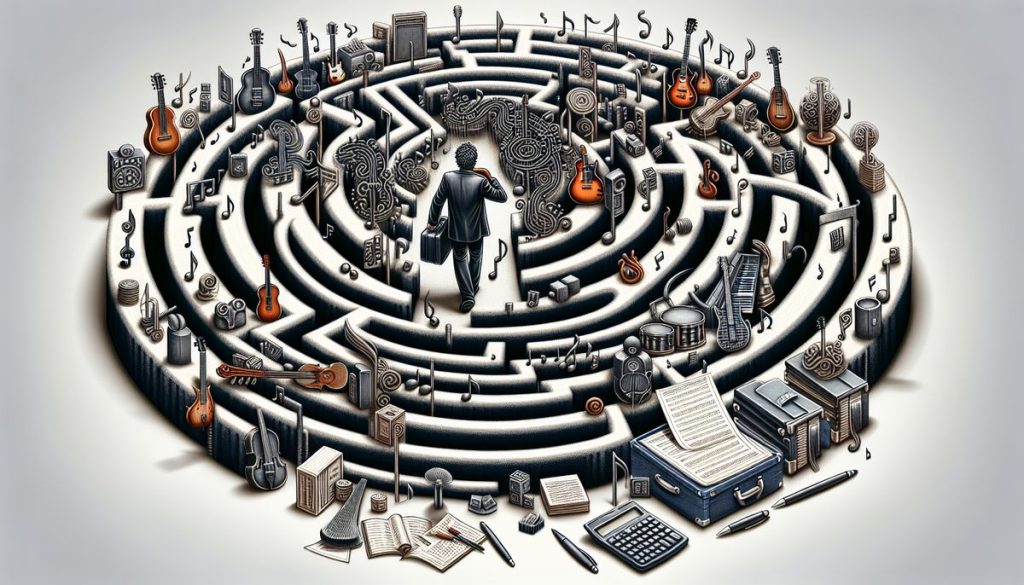Mastering the Music Industry: Navigating Business Formation, Marketing, Finance, and Copyright for Artists
Written by DJ Prodigee on Wed Jan, 2024
The music industry is a complex and intricate world, filled with opportunities and challenges for artists. This article explores the key aspects of the music industry, from business formation and marketing to finance and copyright. It’s designed to help artists navigate the often confusing landscape of the music business, providing practical advice and insights on everything from forming a band to managing finances, marketing music, and protecting intellectual property rights.
Key Takeaways
- Understanding business formation is crucial for musicians, including the evolution from a garage band to a corporation, choosing business partnerships, and navigating legalities and paperwork.
- Mastering music marketing involves building an artist’s brand, understanding digital marketing, and leveraging traditional marketing methods such as merchandise, gigs, and fan interactions.
- Financial navigation in the music industry involves managing finances as an artist, understanding various revenue streams, and balancing music with other income sources.
- Music copyright is a critical area to understand, covering topics like music plagiarism, basic copyright protections, and navigating copyright infringement issues.
- The music industry intersects with various legal areas such as intellectual property rights, trademark law, and even maritime law, requiring artists to stay informed and protected.
So, You Want to Be a Rockstar? Understanding Business Formation
Garage Band to Corporation: The Evolution of Your Music Business
So, you’ve been jamming in your garage, and you’re thinking, ‘Hey, we’re pretty good. Maybe we should take this show on the road.’ But before you start dreaming of groupies and Grammy Awards, there’s a little thing called business formation you need to understand.
Think of your band as a start-up. You’re creating a product (your music), marketing it, and hopefully making some money. But just like any business, you need a solid foundation. That’s where business formation comes in. It’s the process of legally establishing your band as a business entity.
Here’s a simple breakdown of the stages you might go through:
- Garage Band: You’re just playing for fun, and maybe the occasional house party. There’s no real structure or organization.
- Local Band: You’re playing gigs around town, maybe even getting paid. You might want to consider forming a partnership or LLC to protect yourselves and your equipment.
- Touring Band: You’re hitting the road, selling merchandise, and making real money. It’s definitely time to incorporate.
- Corporation: You’re a full-fledged business, with employees, contracts, and a lot of income (and expenses).
Remember, every band’s journey is different, and there’s no one-size-fits-all approach to business formation. But understanding the basics can help you make informed decisions as you rock your way to the top.
Choosing Your Bandmates Wisely: The Importance of Business Partnerships
Choosing your bandmates is a lot like choosing a spouse. You’re going to be spending a lot of time together, making big decisions together, and, if you’re lucky, making a lot of money together. So, you better make sure you’re compatible. And I’m not just talking about musical tastes. I mean, sure, it’s going to be tough if your drummer is all about death metal and you’re more of a pop ballad kind of person. But it’s more than that. It’s about work ethic, reliability, and shared goals.
Here are a few things to consider when choosing your bandmates:
- Musical compatibility: Do you enjoy the same music? Can you agree on a sound for your band?
- Reliability: Can you count on them to show up for practice and gigs?
- Work ethic: Are they willing to put in the time and effort to make the band a success?
- Shared goals: Do you all want the same thing from the band? Is this a fun hobby or a serious career move?
Remember, a band is like a marriage. It takes work, compromise, and a whole lot of patience. But with the right people, it can be a beautiful thing.
So, choose wisely, rockstars. Your bandmates aren’t just people to jam with. They’re your business partners. And the success of your band – and your music career – depends on them.
The Not-So-Sexy Side of Rock ‘n’ Roll: Legalities and Paperwork
So, you’ve got your band, your sound, and your dreams of stardom. But before you can start smashing guitars and throwing TVs out of hotel windows, there’s a little thing called paperwork to deal with. Yes, it’s as glamorous as a pair of old socks, but it’s crucial to your success in the music industry.
First up, you’ll need a Music Recording Contract. This is the document that outlines the terms for creating recorded music with the artist. It’s not just a piece of paper, it’s your ticket to the big time. But beware, it’s also a minefield of legal jargon and potential pitfalls.
Here’s a quick rundown of what your contract should cover:
- Rights and obligations of the parties
- Payment and royalties
- Term and termination
- Confidentiality and non-disclosure
Remember, always read the fine print and don’t be afraid to ask questions. This is your career we’re talking about, after all.
Next, you’ll need to consider the legal and compliance risks of business communication on personal devices. This might sound like a snooze-fest, but trust us, it’s important. You don’t want your band’s dirty laundry aired in public, do you?
Finally, don’t forget about copyright. This is the law that protects your music from being stolen or used without your permission. It’s like a big, legal hug for your songs. And who doesn’t love a good hug?
Selling Out or Selling Records? The Art of Music Marketing
From Bathroom Selfies to Billboard Charts: Building Your Brand
So, you’ve graduated from bathroom selfies and you’re ready to hit the big leagues, huh? Well, strap in, because we’re about to dive into the wild world of brand building in the music industry. It’s not just about having a catchy name and a cool logo anymore, my friend. No, in this digital age, you’ve got to be a master of social media, a wizard of website design, and a guru of SEO. But don’t worry, we’ve got your back.
Here’s a quick rundown of the key steps you’ll need to take:
- Define your brand: What’s your story? What’s your style? What makes you unique?
- Build your online presence: This includes your website, social media profiles, and any other platforms where your fans can find you.
- Engage with your audience: Don’t just post content, interact with your fans. Respond to comments, share fan art, host live Q&As.
- Monitor your brand: Keep an eye on what people are saying about you and adjust your strategy as needed.
Remember, your brand isn’t just what you say about yourself, it’s what others say about you when you’re not in the room.
Now, let’s talk about something a little more advanced: ethical branding and marketing. This is all about creating a brand that resonates with people’s values and beliefs. It’s about pushing the boundaries of traditional marketing to create something that’s not only effective but also deeply meaningful and emotionally resonant. This is what we call ‘brand poetry’.
So, are you ready to go from bathroom selfies to billboard charts? Let’s rock and roll!
The Power of the Playlist: Understanding Digital Marketing
So, you’ve got your tunes, your band, and your dream. Now, it’s time to conquer the digital world. But how? Well, my friend, welcome to the era of playlists. Yes, those little collections of songs that you make when you’re in the shower, or when you’re trying to impress that special someone. They’re more powerful than you think.
Here’s a quick rundown of why playlists are the bee’s knees in digital marketing:
- Visibility: Your song on a popular playlist? That’s like a billboard in Times Square, but for your music.
- Discovery: People are lazy. They don’t want to search for new music. They want it served on a silver platter. Or, in this case, a playlist.
- Credibility: If your song is on a playlist with The Beatles, people will think you’re as cool as The Beatles. Maybe.
Remember, getting on playlists isn’t just about making great music. It’s about networking, understanding your audience, and a bit of luck. So, get out there, make some friends, and start playlisting!
Merch, Gigs, and Fans: Traditional Marketing in the Music Industry
So, you’ve got your band, your sound, and your killer stage presence. Now, it’s time to get down to the nitty-gritty of traditional marketing in the music industry. And no, we’re not talking about selling your soul to the devil for a record deal. We’re talking about merch, gigs, and fans. The holy trinity of music marketing.
First off, let’s talk about merch. It’s not just about slapping your band’s logo on a t-shirt and calling it a day. It’s about creating a brand that your fans can identify with. Think of it as your band’s uniform. And the best part? Every time a fan wears your merch, they’re essentially a walking billboard for your band.
Next up, gigs. They’re your bread and butter. They’re where you get to connect with your fans, showcase your music, and most importantly, sell your merch. But remember, not all gigs are created equal. Some gigs might pay more, but they might not be the right fit for your band. It’s all about finding the right balance.
And finally, fans. They’re the lifeblood of your music career. Without them, you’re just a bunch of guys playing music in a garage. So, how do you get more fans? Well, it’s a combination of great music, killer gigs, and awesome merch. And of course, a little bit of luck never hurts.
Here’s a quick rundown of what we’ve covered:
- Merch: Create a brand, not just a logo.
- Gigs: Find the right balance between pay and exposure.
- Fans: They’re the lifeblood of your music career. Treat them right.
Remember, the music industry isn’t a sprint, it’s a marathon. So, take your time, make smart decisions, and most importantly, keep rocking!
Show Me the Money! Navigating Finance in the Music Industry
Broke Musicians and Expensive Guitars: Managing Your Finances
So, you’ve got your heart set on that vintage Gibson Les Paul, but your bank account is screaming for mercy. Welcome to the world of broke musicians and expensive guitars. But fear not, fellow rockstar, managing your finances in the music industry doesn’t have to be a solo act. Here are some tips to keep you from going broke while chasing your dream:
-
Separate your personal and business finances. It’s essential to keep your personal and business finances separate. Set up a dedicated bank account and credit card for your music-related income and expenses. This will make your life a whole lot easier come tax season.
-
Avoid common financial pitfalls. Many musicians fall into the trap of spending all their gig money on new gear or partying. Remember, your music is a business, and you need to invest in its growth.
-
Plan for the future. It’s easy to get caught up in the excitement of the moment, but don’t forget to plan for your future. This includes setting aside money for retirement and having a backup plan in case your music career doesn’t pan out.
Remember, the key to financial success in the music industry is to treat your music as a business. Keep track of your income and expenses, make smart financial decisions, and always plan for the future.
From Penny Whistles to Platinum Records: Understanding Music Revenue Streams
So, you’ve traded in your penny whistle for a shiny new platinum record. Congrats, rockstar! But now comes the real fun part: understanding how to turn those sweet tunes into cold, hard cash. Let’s break it down, shall we?
First off, there are a few key ways that musicians make money. Here’s a quick rundown:
-
Live performances: This is your bread and butter. Whether it’s a dive bar or a stadium, you’re getting paid to play. Rock on!
-
Record sales: Yes, people still buy music. Especially if it’s on vinyl or some other hipster-approved format.
-
Merchandise: T-shirts, posters, limited-edition bandanas… if you can slap your band’s logo on it, you can sell it.
-
Streaming: Spotify, Apple Music, and the like may not pay much per stream, but those fractions of a penny can add up.
-
Licensing: If your song ends up in a movie, TV show, or commercial, that’s a nice little payday.
Remember, diversifying your revenue streams is key. Don’t put all your eggs in one basket, or all your records in one crate, as the case may be.
Now, not all of these will apply to every musician, and some may be more lucrative than others. It’s all about finding the right mix for you and your music. And remember, while making money is important, it’s not the only measure of success. After all, you didn’t get into this business just to get rich, right? (If you did, we need to have a different conversation.)
Don’t Quit Your Day Job… Yet: Balancing Music and Money
So, you’re a musician with a day job. You’re not alone. Many artists keep their 9-to-5 while they’re building their music career. But how do you balance the two? Well, it’s a bit like juggling flaming guitars while riding a unicycle on a tightrope. But don’t worry, we’ve got some tips to help you out.
First, let’s talk about finances. It’s important to have a solid understanding of your income and expenses. Here’s a simple table to help you keep track:
| Income Source | Amount |
|---|---|
| Day Job | $X |
| Music Revenue | $Y |
| Other | $Z |
Next, consider your time. You’ve got rehearsals, gigs, and maybe even a tour to plan around your day job. It’s crucial to set boundaries and manage your time effectively. Here are a few tips:
- Set specific times for music-related activities
- Communicate your schedule with your bandmates and employer
- Prioritize rest and self-care
Remember: It’s a marathon, not a sprint. Don’t burn yourself out trying to do everything at once.
Finally, don’t forget about your long-term goals. Are you aiming to quit your day job eventually? If so, you’ll need a financial plan. Consider consulting with a financial advisor who understands the unique challenges of the music industry. They can help you navigate the financial tightrope and keep those flaming guitars in the air.
Who Stole My Riff? A Crash Course in Music Copyright
Theft or Tribute? Understanding Music Plagiarism
So, you’ve just written a killer riff that’s going to catapult your band to stardom. But wait, does it sound a bit too familiar? Is it a tribute to your favorite band, or have you accidentally committed music plagiarism? Let’s break it down.
Music plagiarism is when you use someone else’s music and pass it off as your own. It’s like taking someone else’s cake, putting your own icing on it, and then claiming you baked it. Not cool, right? But sometimes, it’s not as black and white as it seems. Here’s a quick guide to help you navigate these murky waters:
-
Direct Copying: This is the most blatant form of music plagiarism. It’s like copying your friend’s homework word for word. If you’ve used a significant part of someone else’s song without permission, you’re in hot water, my friend.
-
Subconscious Plagiarism: Ever had a melody stuck in your head and later wrote a song that sounds eerily similar? That’s subconscious plagiarism. It’s tricky because you might not even realize you’re doing it.
-
Cryptomnesia: This is when you think you’ve come up with an original piece of music, but it’s actually something you’ve heard before and forgotten about. It’s like finding an old shirt in your closet and thinking you’ve just bought it.
Remember, imitation might be the sincerest form of flattery, but in the music industry, it can also land you in a heap of legal trouble. So, always strive for originality and when in doubt, seek legal advice.
Now, let’s say you’ve accidentally committed music plagiarism. What’s the worst that could happen? Well, you could be sued for copyright infringement, which could cost you a lot of money. And we’re not talking chump change here. We’re talking ‘sell your guitar and live in a van’ kind of money. So, tread carefully, rockstars.
Sampling, Covers, and Lawsuits: Navigating Copyright Infringement
So, you’ve just created the next chart-topping hit, but wait! That catchy riff you used, was it a sample from another song? Or that cover you did of a classic, did you get the necessary permissions? Welcome to the wild world of music copyright infringement, where the lines between homage and theft can be as blurry as a bassist after a three-day gig.
Here’s a quick rundown of some key points to remember:
-
Sampling: If you’re using a piece of someone else’s music in your own, you need to get permission. No, it doesn’t matter if it’s just a couple of seconds. Yes, even if you’ve changed it a bit.
-
Covers: Doing your own version of someone else’s song? You’ll need a mechanical license. And no, changing the lyrics to make it about your ex doesn’t make it a new song.
-
Lawsuits: If you’ve infringed on someone’s copyright, you could be sued. And trust me, ‘But I’m a struggling artist!’ is not a valid defense in court.
Remember, when in doubt, ask for permission. It’s better to be safe than sorry (and broke).
So, before you release that next big hit, make sure you’re not stepping on any legal toes. Because the only thing worse than a one-hit wonder is a one-lawsuit wonder.
Conclusion
So, there you have it, folks! We’ve journeyed through the wild and wacky world of the music industry, from the thrilling birth of a business to the nitty-gritty of finance, and even the mind-boggling maze of copyright law. Remember, whether you’re an artist, a manager, or a paralegal, the music industry is a beast that can be tamed with the right knowledge. So, keep your wits about you, never stop learning, and most importantly, don’t forget to have fun! After all, it’s not just business, it’s music. And in the immortal words of one David Bowie, ‘I don’t know where I’m going from here, but I promise it won’t be boring.’







